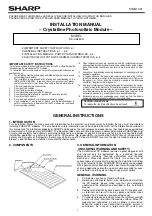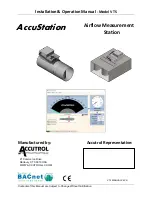
SIMA1401
4
INSTALLATION MANUAL -PHOTOVOLTAIC MODULES-
1. INSTALLATION
The mounting method has been verified by SHARP and NOT
CERTIFIED by a third party organization. Please review the
descriptions and drawings carefully; not mounting the modules
according to one of these methods may void your guaranty.
These mounting methods are designed to allow module loading
of 2400Pa.
Mounting Using Clips: Clamping on Longer Frame (Figure2)
The modules can be mounted using clips (clamps) designed for solar
modules as defined in the following Figures. Note that the mounting clips
should meet the required dimensions as defined in the Figure1. Note that
the
CLIP CENTER POSITION (e)
is important as specified in the Figure2.
The module must be supported on the array system and should overlap
the array rail by at least 10mm. The array rails (see pointillist image, row
or vertical row) must support the bottom of the frames and must be
continuous piece (no breaks in the rail).
2. ELECTRICAL INSTALLATION INSTRUCTION
CABLE requirement
Conductor size: 4.0mm
2
,
Cable type: XLPE cable (H1Z2Z2-K cable)
Maximum DC voltage: 1.5kV
Rating temperature: -40°C to +90°C,
Module configuration (Recommend)
# Maximum series configuration: please refer to Table-1
(This value is calculated under the condition of Voc at -40 °C.)
# Maximum parallel configuration: (Parallel connection of each
string shall be conducted with following two options. Any other
parallel connections are prohibited.)
a) Case of using the diodes; 1 diode per maximum 2 parallel
strings (Connect a diode or more in series for every string or
every 2 parallel strings for protection of module from reverse
current over load.)
b) Case of using the fuses; 1 fuse per every string (Connect a
fuse for every single string for protection of module from reverse
current over load.)
CONNECTOR requirement
The module shall be mated to the same connectors;
Type: PV-XT101.1
Brand: Suzhou Xtong Photovoltaic Technologies Co., Ltd.
3. WARNING
Keep all MODULES and electriacal
CONNECTORS clean & dry before
installation.
4. Disposal
Dispose photovoltaic modules properly.
For Information about the proper disposal,
contact your local recycling site
.
ELECTRICAL OUTPUT AND THERMAL CHARACTERISTICS
Rated electrical characteristics of Isc, Voc, are within ±10 percent of the indicated values and +5/-0 percent of Pmax (power measurement tolerance: ± 3%),
under STC (standard test conditions) (irradiance of 1000 W/m
2
, AM 1.5 spectrum, and a cell temperature of 25 °C (77°F)).
Table-1. Electrical characteristics (at STC)
M odel
name
M aximum
Power
(Pmax)
Tolerance
Open-Curcuit
Voltage
(Voc)
Short-Circuit
Current
(Isc)
Voltage at point
of max. Power
(Vmpp)
Current at point
of max. Power
(Impp)
M aximum
system voltage
Over-Current
Protection
Application
Class
M aximum series
configuration(*)
ND-AH330H
330W
+5%/-0%
46.2V
9.33A
37.8V
8.73A
1,500V
15A
A
26
* The maximum series number of modules depends on the local conditions. These values are calculated under the condition of Voc at -40 °C.
Under normal conditions, a photovoltaic module is likely to experience conditions that produce more current and/or voltage than
reported at Standard Test Conditions. Accordingly, the values of Isc and Voc marked on this module should be multiplied by a
factor of 1.25 when determining component voltage ratings, conductor capacities, fuse sizes and size of controls connected to the
module output.
Application Class
This module is rated as “Application class A”
according to
IEC61730.
“Application class A” means:
General access, hazardous
voltage, hazardous power applications; Modules rated for
use in this application class may be used in systems
operating at greater than 50V DC or 240W, where general
contact access is anticipated. Modules qualified as
“
Application class A
”
according to IEC 61730 are
considered to meet the requirements for safety class II.
FIRE RATING
This module is rated as “Fire safety class C” according
to
IEC61730.
250 mm <
e
< 400 mm
e
: span from module corner to clip center
Figure2. Clamping on longer Frame
Figure1. Clips (Clamps) requirement
1) Clip: Al alloy, 3mm Min. thickness
2) Catch length (50mm Min.)
3) Covering depth (7mm Min. on the frame)
4) Supporting depth (10mm Min.)
5) Frame
(applicable to all frame sections)
6) Array rail
(applicable to parallel or crossed mounting)






















